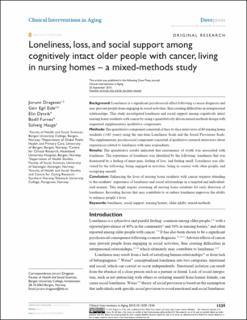| dc.contributor.author | Drageset, Jorunn | |
| dc.contributor.author | Eide, Geir Egil | |
| dc.contributor.author | Dysvik, Elin | |
| dc.contributor.author | Furnes, Bodil | |
| dc.contributor.author | Hauge, Solveig | |
| dc.date.accessioned | 2016-04-07T13:21:34Z | |
| dc.date.accessioned | 2020-03-18T10:44:05Z | |
| dc.date.available | 2016-04-07T13:21:34Z | |
| dc.date.available | 2020-03-18T10:44:05Z | |
| dc.date.issued | 2015-05 | |
| dc.identifier.citation | Drageset, J., Eide, G.E., Dysvik, E. et al. (2015) Loneliness, loss and social support among cognitively intact older people with cancer, living in nursing homes - a mixed-methods study. Clinical Interventions in Aging, 2015(10), 1529-1536 | nb_NO |
| dc.identifier.issn | 1178-1998 | |
| dc.identifier.uri | http://hdl.handle.net/11250/2647370 | |
| dc.description | - | nb_NO |
| dc.description.abstract | Background: Loneliness is a significant psychosocial effect following a cancer diagnosis and may prevent people from engaging in social activities, thus creating difficulties in interpersonal relationships. This study investigated loneliness and social support among cognitively intact nursing home residents with cancer by using a quantitatively driven mixed-methods design with sequential supplementary qualitative components.
Methods: The quantitative component consisted of face-to-face interviews of 60 nursing home residents (≥65 years) using the one-item Loneliness Scale and the Social Provisions Scale. The supplementary psychosocial component consisted of qualitative research interviews about experiences related to loneliness with nine respondents.
Results: The quantitative results indicated that reassurance of worth was associated with loneliness. The experience of loneliness was identified by the following: loneliness that was dominated by a feeling of inner pain, feeling of loss, and feeling small. Loneliness was alleviated by the following: being engaged in activities, being in contact with other people, and occupying oneself.
Conclusion: Enhancing the lives of nursing home residents with cancer requires attending to the residents’ experience of loneliness and social relationships in a targeted and individualized manner. This might require screening all nursing home residents for early detection of loneliness. Revealing factors that may contribute to or reduce loneliness improves the ability to enhance people’s lives. | nb_NO |
| dc.language.iso | eng | nb_NO |
| dc.publisher | Dove Press | nb_NO |
| dc.rights | Navngivelse-Ikkekommersiell 4.0 Internasjonal | * |
| dc.rights.uri | http://creativecommons.org/licenses/by-nc/4.0/deed.no | * |
| dc.subject | geriatri | nb_NO |
| dc.subject | onkologi | nb_NO |
| dc.subject | ensomhet | nb_NO |
| dc.subject | sykehjem | nb_NO |
| dc.subject | eldre pasienter | nb_NO |
| dc.title | Loneliness, loss and social support among cognitively intact older people with cancer, living in nursing homes - a mixed-methods study | nb_NO |
| dc.type | Journal article | nb_NO |
| dc.date.updated | 2016-04-07T13:21:34Z | |
| dc.rights.holder | © 2015 Drageset et al. | nb_NO |
| dc.subject.nsi | VDP::Medical disciplines: 700::Clinical medical disciplines: 750::Geriatrics: 778 | nb_NO |
| dc.source.pagenumber | 1529-1536 | nb_NO |
| dc.source.volume | 2015 | nb_NO |
| dc.source.journal | Clinical Interventions in Aging | nb_NO |
| dc.source.issue | 10 | nb_NO |
| dc.identifier.doi | 10.2147/CIA.S88404 | |
| dc.identifier.cristin | 1263425 | |

